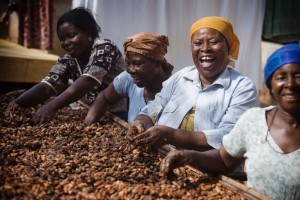To Nurture the Freedoms of People
The Nobel Prize-winning economist Amartya Sen has spoken of how true development in any society (in affluent as well as developing countries) needs to be thought of in terms of the progress made in the different kinds of freedoms experienced by individuals. This goes beyond freedom from tyranny to include the range of goods that bring about human flourishing and the expression and increase of human capacity in the Aristotelian sense. Sen argues that freedoms can build upon each other: political freedoms can promote economic security; social freedoms can enhance economic participation; economic productivity can in turn increase personal and public resources (e.g., education) for further enhancement of human capacities. As such, freedoms are both ends in themselves but also the means for further development. This is exciting. It shows how good work in one area must be seen as connecting to good work in other areas. In a world where the needs seem so great, one can begin to feel somewhat helpless since no single individual or even organization can get at them all. But every part can be linked to others–every part can help to enhance human flourishing. Such a lofty hope is one appropriate for Americans reflecting on July 4th.
 Income poverty is not the same thing as capability poverty, but the reality is that they are often closely linked. As we consider the good that microfinance services can provide, it is important to see that what we are working for is not just the increase of our clients’ incomes, but the enhancement of their lives and capabilities that are often linked with expanding productivity: we are concerned about women’s empowerment, about gender equality, about employment, about access to healthcare, and about access to markets. That these impacts may, in turn, have further positive impact on the social and political freedoms that our clients experience is something we welcome and celebrate. Poverty is an issue not simply because of the lowness of incomes, but because it deprives people of capabilities – both the enjoyment of the freedoms that bring human flourishing, and further development that can result from them. This, too, is exciting.
Income poverty is not the same thing as capability poverty, but the reality is that they are often closely linked. As we consider the good that microfinance services can provide, it is important to see that what we are working for is not just the increase of our clients’ incomes, but the enhancement of their lives and capabilities that are often linked with expanding productivity: we are concerned about women’s empowerment, about gender equality, about employment, about access to healthcare, and about access to markets. That these impacts may, in turn, have further positive impact on the social and political freedoms that our clients experience is something we welcome and celebrate. Poverty is an issue not simply because of the lowness of incomes, but because it deprives people of capabilities – both the enjoyment of the freedoms that bring human flourishing, and further development that can result from them. This, too, is exciting.
But we’re aware that this conceptualization also raises important areas for us to explore. Although Sen’s argument lays out the very real possibility for these linkages between freedoms to exist, it’s also quite clear that they cannot be assumed. As a microfinance organization desiring to further such “virtuous cycles,” we need to be asking whether our operations are truly enhancing our clients’ lives in this way or not. This requires that we specifically conduct focused research to this end and build our programs so that they are evidence-based and optimize the chances for such outcomes among our clients. Remembering the freedoms celebrated in the U.S., then, causes us to dare to hope for expanded freedoms for others, to delight in the possibility that the work of microfinance is impacting development in multi-faceted ways, and to take on the challenge of looking carefully at the nature of our operations so that we can see if broader impacts are taking place.
Genzo Yamamoto, Ph.D., is the director of knowledge management at Opportunity International. Prior to joining Opportunity in 2011, he taught modern international political and intellectual history at Boston University and at Wheaton College. Genzo earned his doctorate at Yale and the Certificate in Evaluation Practice from The Evaluators’ Institute at George Washington University.